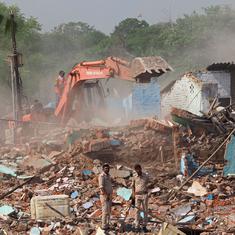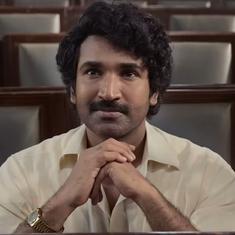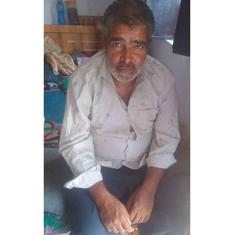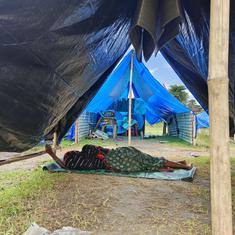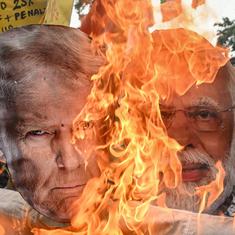The special train left Amritsar at two in the afternoon and reached Mughalpura after eight hours. A lot of people were killed on the way. Many were injured and some got lost here and there.
At ten in the morning, when Sirajuddin opened his eyes on the cold floor of the camp, he saw around him a turbulent sea of men, women and children. He was at a loss. For a long time, he kept staring at the murky sky. Though every corner of the camp was reverberating with noise, it seemed as though old Sirajuddin’s ears were sealed. He could not hear anything. Anyone who saw him would think he was lost in deep thought but that wasn’t the case. His senses had been numbed. His entire being seemed as if it was suspended in empty space.
While gazing aimlessly at the murky sky, Sirajuddin’s eyes met the sun. Its bright rays penetrated and settled into the fibres of his being and he woke up. Several images flitted across his mind. Looting, fire … chaos … station … bullets … night, and Sakina … Sirajuddin stood up with a start and, with a mad fervour, began rummaging through the sea of people around him.
For three hours, he went around the camp shouting, “Sakina! Sakina!” But his search proved as futile as trying to separate ash from ash; he found no traces of his young daughter, his only child. There was chaos all around him. Some were searching for their children, some their mothers. Some, their wives and some, their daughters. Exhausted, Sirajuddin sat down in a corner and strained his memory to remember when and where he had got separated from Sakina. But thinking about this only brought back to his mind’s eye the corpse of Sakina’s mother, with her guts spilled out. He could not think any more after that.
Sakina’s mother was dead. She had died before Sirajuddin’s eyes. But where was Sakina, about whom her mother had said while dying, “Leave me, take Sakina and quickly run away from here.”
Sakina had been with him. Both of them were running barefoot. Sakina’s dupatta had fallen. He had wanted to stop and pick it up, but Sakina had shouted, “Abba-ji, leave it.” However, he had picked up the dupatta … while thinking about this, he looked at the bulging pocket of his coat, and putting his hand in it, pulled out a piece of cloth. It was Sakina’s dupatta.
But where was Sakina?
Sirajuddin strained his exhausted mind, but he couldn’t come to any conclusions. Had he brought Sakina to the station with him? Was she on the train with him? When the train had stopped on the way and the rioters had barged in, had he fainted and then they had taken her away?
There were many questions in Sirajuddin’s mind, but not a single answer. He needed compassion. But all the people spread out around him needed compassion too. Sirajuddin wanted to cry but his eyes did not cooperate. Who knows where the tears had disappeared?
Six days later, when he had managed to somewhat collect himself, he met people who were willing to help him. Eight young men with a lorry and guns. Sirajuddin gave them a lakh blessings and described Sakina to them. “Fair and very beautiful … not like me, looks like her mother. She is about seventeen. Has big eyes, dark hair, there’s a big mole on her right cheek. She’s my only daughter. Please find her. Khuda will bless you.”
With great enthusiasm, the eight men assured old Sirajuddin that if his daughter was alive, then she would be back with him within a few days.
The young men tried their best. Putting their lives on the line, they went to Amritsar. They helped several women, men and children along the way, taking them to safety. Ten days passed this way, but Sakina was still nowhere to be found.
One day, they had set out on the lorry to Amritsar for this very task when they spotted a girl by the road in Chuhrat.
She was startled when she heard the sound of the lorry and began running. The young volunteers stopped the motor and started running after her. They caught up with the girl on a farm. She was indeed very beautiful. There was a big mole on her right cheek. One of the boys said to her, “Don’t be afraid … is your name Sakina?”
The girl’s face paled even more. She did not answer, but when the boys reassured her, her fear was assuaged and she admitted that she was Sirajuddin’s daughter, Sakina.
The eight volunteers tried to put Sakina at ease in every way possible. They fed her, gave her some milk and made her sit in the lorry. One of them removed his coat and gave it to her because she looked uncomfortable without her dupatta and repeatedly kept trying to cover her chest with her arms.
Many days passed, Sirajuddin got no news of Sakina. He would spend all his days visiting different camps and offices. But there was no sign of Sakina. Till late into the nights, he would pray for the success of those young volunteers – the ones who had reassured him that if Sakina was alive, she would be back with him in a few days.
One day, in the camp, Sirajuddin saw those young volunteers in the camp. They were sitting in the lorry. Sirajuddin ran to them. The lorry was just about to move when he asked, “Beta, did you find out anything about my Sakina?”
All of them said in unison, “We will, we will.” And the lorry started moving.
Sirajuddin again prayed for the success of those young men, and he felt somewhat lighter.
That evening, there was some commotion in the camp near where Sirajuddin was sitting. Four men were carrying something. When he enquired, he was told that a girl was found unconscious near the railway line, and the people had carried her here. Sirajuddin followed the crowd. The people handed the girl over to the hospital staff and left. For a while, Sirajuddin stood leaning on a wooden pole outside the hospital. Then, slowly, he went in. There was no one in the room. Just a corpse on a stretcher. Taking small steps, Sirajuddin moved towards it. Suddenly, there was light in the room. Sirajuddin looked at the mole on the pale face of the dead body and screamed, “Sakina!”
The doctor who had turned the lights on asked Sirajuddin, “What is it?”
Sirajuddin struggled to get the words out. “Ji, I … I’m … her father.”
The doctor looked at the corpse on the stretcher. He looked for her pulse and told Sirajuddin, “The window, open it.”
Something stirred within Sakina’s lifeless body. Her spiritless hands undid the drawstring of her salwar and moved it down. Old Sirajuddin exclaimed with great joy, “She’s alive … my daughter is alive!” The doctor simply stood there, drenched in sweat.
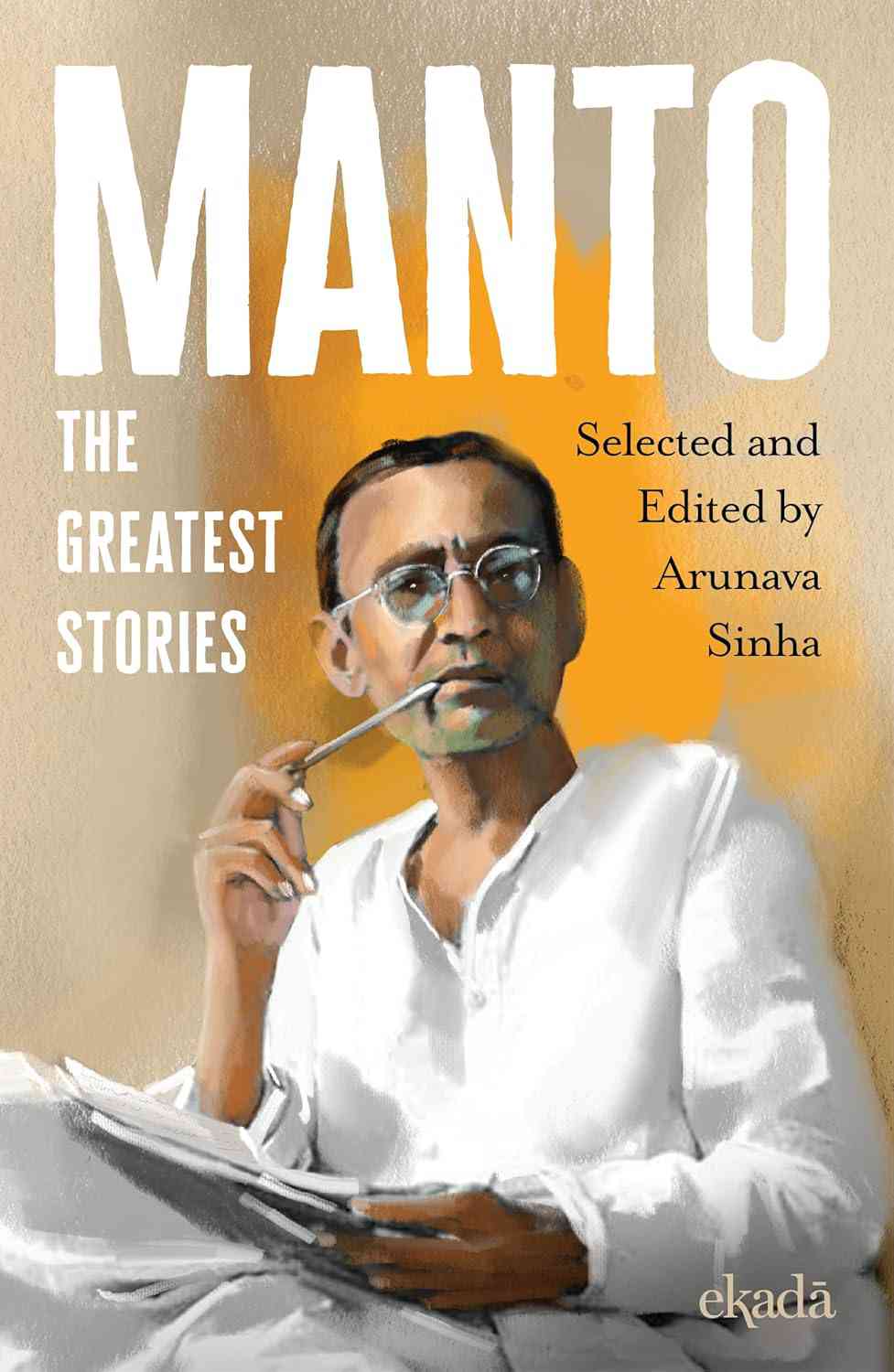
Excerpted with permission from ‘Open It’, by Saadat Hasan Manto, translated by Sonakshi Gupta, in Manto: The Greatest Stories, selected and edited by Arunava Sinha, Ekada/Westland.
Disclosure: Arunava Sinha is the editor of Books and Ideas section of Scroll.
